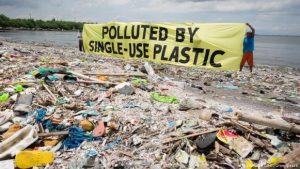The recent announcement by the Lagos State Government to impose an immediate ban on styrofoam and single-use plastics is a bold but necessary one. It marks a historic moment in Nigeria’s ongoing battle against environmental degradation.

The move, made on Sunday, January 21, 2024, reflects a growing recognition of the urgent need to address the environmental impact of non-biodegradable materials and the indiscriminate disposal practices associated with them. However, we must ensure that it is sustainable and causes a necessary shit to more sustainable waste management of single used plastic, in addition to other effort to discourage increased usage.
The statistics provided by the Lagos Waste Management Authority (LAWMA) and the United Nations Environment Programme (UNEP) underscore the magnitude of the problem. Being a megacity with approximately 22 million inhabitants, Lagos State is said to generate 870,000 tonnes of plastic waste annually, and millions of tonnes of plastic waste in the water ways, drainages and the oceans, urgent action is obviously necessary.
The ban aligns with broader national attempt to regulate single used plastics. It would have aligned well with the Federal Government attempt to impose a 10 percent tax on single-use plastics in the first quarter of 2023, which was later suspended by President Bola Tinubu in other to reduce business cost on local manufacturer. This step by the Lagos State Government signals a step in the right direction, emphasizing a proactive stance toward environmental sustainability. But huddles of implementation persist though.
The ban holds promise in addressing inherent waste management challenges not only in Lagos State but also in other parts of the country. Single-use plastics, often used for packaging, contribute significantly to pollution due to their non-biodegradable nature. By curbing their use, the government aims to reduce plastic waste generation, aligning with the National Policy on Plastic Waste Management’s goal to cut plastic waste by 50 percent of the 2020 baseline by 2025.
However, publicly announcing a ban is different from having the capacity and political will to implement it, to ensure compliance. The Lagos State Government needs to assess itself to determine whether it has what it takes to implement both carrot and/or stick to ensure the ban works and does not catapult into another socioeconomic and environmental problem.
While the ban on single-use plastics and styrofoam in Lagos State is a commendable step towards environmental sustainability, it is essential to address the potential socioeconomic challenges that may arise, including the loss of jobs in affected industries. A comprehensive implementation strategy should take into account the need to accelerate the production and affordability of biodegradable alternatives, ensuring a smooth transition for both the environment and the workforce.
Consideration should be given for the establishment of job transition programmes to support workers affected by the ban, particularly those employed in industries related to the production and distribution of single-use plastics and styrofoam. The Lagos state government, and by extension the federal government should Introduce financial incentives and subsidies for businesses engaged in the production of biodegradable alternatives to these single used plastics. This can include tax breaks, grants, or low-interest loans to encourage the adoption and expansion of environmentally friendly alternatives. Should Lagos State Government decide to float another Green Bond after its N20 billion in 2022 Green Bond, such carrots can be engineered using the state Green Bond, and other climate financing mechanism.
There is also the need to allocate funds for research and development initiatives focused on enhancing the production efficiency and affordability of biodegradable materials. This can involve partnerships with academic institutions, private enterprises, and research organisations.
The Lagos State Government should also engage with industry stakeholders, including manufacturers, distributors, and retailers, to understand their concerns and challenges. Collaborate on finding sustainable solutions, such as transitioning towards producing eco-friendly alternatives or integrating recycling initiatives.
Knowledge is power, so implementation of a robust consumer education campaigns to raise awareness about the environmental impact of single-use plastics and the benefits of transitioning to biodegradable, and reusable alternatives is necessary. Deliberate public investment must be made towards making biodegradable and reusable alternatives more affordable and accessible to the general population, to ensure that the transition is feasible for consumers at various economic levels.
Such can be done with accountable and transparent public-private partnerships to accelerate the development and production of biodegradable materials. Collaboration between government bodies, private enterprises, international development partners and local communities can lead to more innovative solutions and more rapid adoption of sustainable practices.
The Lagos State Government should consider a phased implementation of the ban, allowing businesses and workers sufficient time to adapt to the changes. Monitor the transition closely, gathering feedback from affected industries and making adjustments to the implementation strategy as needed. In summary, the effective implementation of the ban requires a multifaceted approach. Public engagement and awareness campaigns are crucial to garner support and encourage the adoption of eco-friendly alternatives. Strict enforcement measures are necessary to ensure compliance. Improving waste management infrastructure, including recycling facilities, will be pivotal in handling the transition away from single-use plastics sustainably.
Considering the Lagos State Government’s initiative, the Federal Government should consider several key steps. Firstly, there is a need for policy harmonisation to ensure that national policies align with and support the efforts of individual states. Secondly, investment in research and development for sustainable alternatives to single-use plastics is essential.
The ongoing support from the European Union (EU) for developing national plastic waste regulations with Nigerian Environmental Standards and Regulatory Enforcement Agency (NESREA) and the Federal Ministry of Environment is a positive step, and continued collaboration with stakeholders is vital. The Federal Executive Council (FEC) and the National Assembly should support these efforts.
To close, I strongly believe the Lagos State Government’s ban on styrofoam and single-use plastics is a significant stride towards mitigating environmental challenges. However, its success hinges on effective implementation, public cooperation, and collaborative efforts at the national level. Balancing environmental considerations with economic implications will be key to achieving a sustainable and environmentally friendly future.
By Donald Ikenna
